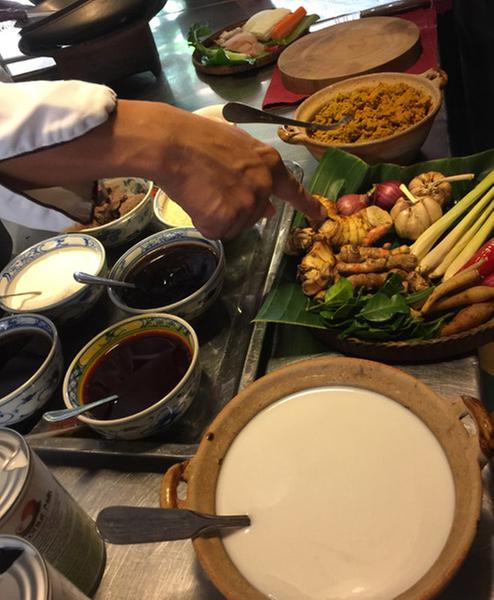Fight smog at dinner?

 |
| Mackerel is loaded with anti-inflammatory omega-3 fatty acids. Wood-ear fungus won't help your lungs. The science is mixed on turmeric, a favorite of ayurvedic medicine. [Photo provided to China Daily] |
Besides promoting long-term health, digestion is relevant when we consider foods often touted as TCM "cures" for smog.
Liu Quanqing, president of the Beijing Hospital of Traditional Chinese Medicine, recently told CCTV that foods like pig's blood, kelp, radish and wood-ear fungus (mu'er) can not alleviate health conditions brought on by smog. Food is absorbed into our digestive systems, while PM2.5 particles end up in our lungs. Other experts note that while some research shows animal blood can affect the digestive tract and help absorb poisonous materials from our food, science has not demonstrated that these foods can reach the lungs or affect them. Ginger, meanwhile, contains very potent anti-inflammatory compounds according to some clinical studies, but its benefits are associated more with arthritis-related ailments than respiratory issues.
Liu also pooh-poohed the idea that herbal teas can counteract the effects of air pollution, and he advised consumers not to buy such "misleading" products.
"I've looked at many formulas. They all contain ingredients that are medicines and can't be used as food, which may cause health problems if taken for a long time," he says.
One university in Henan distributed an anti-smog tea product to all of its students during a particularly grim stretch of bad-air days, but said later it was not meant to prevent the negative effects of pollution. "Actually, this concoction is meant to relieve the symptoms of respiratory distress that air pollution causes."
So what about that mackerel?
One of the richest sources of omega-3 fatty acids is oily fish, such as mackerel or salmon. One physical effect of air pollution is inflammation, which studies suggest can be controlled by omega-3. So if you're struggling with respiration issues, you might want to visit a Japanese restaurant grill more often. A nicely grilled mackerel is much yummier than fish-oil supplements or other sources of omega-3, such as flaxseed, walnuts and chia seeds.
During the recent winter heating season, turmeric was suddenly a theme at some northern China eateries. Coincidence? The pungent rhizome and leaves of the plant are used to flavor dishes from Southeast Asia to Iran, and ayurvedic medicine has championed turmeric's principal constituent, curcumin, as an antioxidant and anti-inflammatory. The scientific jury is still out: numerous clinical trials for various human diseases and conditions have been inconclusive, but the spice has plenty of fans who swear by it. Since it tastes so good, why not experiment yourself with a Pollution Fighter juice shot containing the stuff from Juice by Melissa in Beijing, or a savory turmeric latte (it's caffeine-free) at Tribe in Beijing or Shanghai.




































